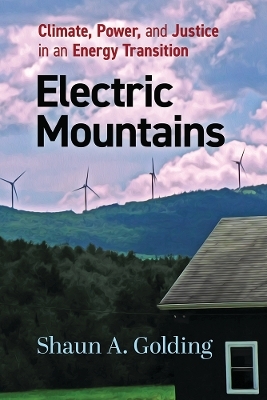
Electric Mountains
Climate, Power, and Justice in an Energy Transition
Seiten
2021
Rutgers University Press (Verlag)
978-1-9788-2068-5 (ISBN)
Rutgers University Press (Verlag)
978-1-9788-2068-5 (ISBN)
Examines how wind turbines have starkly split a community of environmentalists, as well as several communities. In doing so, the book casts a critical light on the roadmap for energy transition that Northern New England’s ridgeline wind projects demarcate.
Climate change has shifted from future menace to current event. As eco-conscious electricity consumers, we want to do our part in weening from fossil fuels, but what are we actually a part of?
Committed environmentalists in one of North America’s most progressive regions desperately wanted energy policies that address the climate crisis. For many of them, wind turbines on Northern New England’s iconic ridgelines symbolize the energy transition that they have long hoped to see. For others, however, ridgeline wind takes on a very different meaning. When weighing its costs and benefits locally and globally, some wind opponents now see the graceful structures as symbols of corrupted energy politics.
This book derives from several years of research to make sense of how wind turbines have so starkly split a community of environmentalists, as well as several communities. In doing so, it casts a critical light on the roadmap for energy transition that Northern New England’s ridgeline wind projects demarcate. It outlines how ridgeline wind conforms to antiquated social structures propping up corporate energy interests, to the detriment of the swift de-carbonizing and equitable transformation that climate predictions warrant. It suggests, therefore, that the energy transition of which most of us are a part, is probably not the transition we would have designed ourselves, if we had been asked.
Climate change has shifted from future menace to current event. As eco-conscious electricity consumers, we want to do our part in weening from fossil fuels, but what are we actually a part of?
Committed environmentalists in one of North America’s most progressive regions desperately wanted energy policies that address the climate crisis. For many of them, wind turbines on Northern New England’s iconic ridgelines symbolize the energy transition that they have long hoped to see. For others, however, ridgeline wind takes on a very different meaning. When weighing its costs and benefits locally and globally, some wind opponents now see the graceful structures as symbols of corrupted energy politics.
This book derives from several years of research to make sense of how wind turbines have so starkly split a community of environmentalists, as well as several communities. In doing so, it casts a critical light on the roadmap for energy transition that Northern New England’s ridgeline wind projects demarcate. It outlines how ridgeline wind conforms to antiquated social structures propping up corporate energy interests, to the detriment of the swift de-carbonizing and equitable transformation that climate predictions warrant. It suggests, therefore, that the energy transition of which most of us are a part, is probably not the transition we would have designed ourselves, if we had been asked.
SHAUN A. GOLDING is an associate professor of sociology at Kenyon College in Gambier, Ohio. He is the author of numerous peer-reviewed book chapters and journal articles.
List of Illustrations
Preface
1. Introduction
2. Windy Ridgelines, Social Fault Lines
3. For the Love of Mountains: The Green Politics of Place
4. But What If…? Wind and the Discourse of Risk
5. Following Power Lines: A Regional Political Economy of Renewables
Part I. The Money
Part II. The People
6. Scripted in Chaos
7. Why We Follow the Slow Transition Road Map
8. Ecological Modernizations or Capitalists Treadmills?
9. Energy and “Justice” in the Mountains
10. Reimagining Energy
Epilogue
Acknowledgments
Notes
Bibliography
Index
| Erscheinungsdatum | 14.02.2022 |
|---|---|
| Zusatzinfo | 11 b-w images, 1 table |
| Verlagsort | New Brunswick NJ |
| Sprache | englisch |
| Maße | 152 x 229 mm |
| Gewicht | 399 g |
| Themenwelt | Sozialwissenschaften ► Politik / Verwaltung ► Staat / Verwaltung |
| Sozialwissenschaften ► Soziologie ► Empirische Sozialforschung | |
| Technik ► Elektrotechnik / Energietechnik | |
| ISBN-10 | 1-9788-2068-2 / 1978820682 |
| ISBN-13 | 978-1-9788-2068-5 / 9781978820685 |
| Zustand | Neuware |
| Haben Sie eine Frage zum Produkt? |
Mehr entdecken
aus dem Bereich
aus dem Bereich
Organisationen steuern, Strukturen schaffen, Prozesse gestalten
Buch | Softcover (2024)
Rehm Verlag
CHF 53,20
Buch | Softcover (2024)
Springer Fachmedien Wiesbaden GmbH (Verlag)
CHF 41,95


